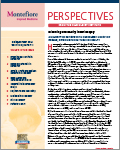Neurology - Research and Clinical Trials - New York City - Montefiore Medical Center
Click here to read about the latest research at the Narcolepsy Institute in the most recent issue of Perspectives
Since its inception, the Department of Neurology at Montefiore Medical Center has dedicated a significant portion of its resources and facilities to research. This is why we are able to offer an unsurpassed level of sophistication with respect to treatments and services. We have one of the most comprehensive autism programs, which is evaluating tools and efficacy through cognitive and social skills interventions. We are partnering with New York City and Westchester school districts to demonstrate to teachers and parents how to use these techniques in the classrooms and at home so that we may reach out to more patients than those that come to traditional autism centers.
We have also been conducting ground-breaking studies pertaining to neurodegenerative diseases such as ALS, Alzheimer's and Parkinson's diseases for nearly a decade, and we view them as disorders that begin in early development, rather than at the onset of the aging process. These disorders are quite common; however, more than 200 degenerative diseases exist. We are able to treat not only the basic forms, but also the rarest types of dementia and Alzheimer's disease because we continue to provide individualized treatments and advanced clinical trials.
The concept that neurological diseases may appear during critical life stages as early as birth is revolutionary. It not only allows us to form insights into common mechanisms, but it also enables us to identify molecular targets through specialized laboratory studies to develop better treatments and ultimately promote longevity. Our real hope is to pinpoint biomarkers as early as possible in life, so patients who did not know they were at risk may have access to early detection and advanced neuroimaging to track the efficacy of therapeutics.
Another exciting aspect of our vast research division is that we operate one of the most prominent neural stem cell laboratories in the world - but not for transplantation. The adult brain has an enormous reservoir of stem cells already and the future of tissue remodeling will offer the ability to activate those cells. At Montefiore Medical Center, we are defining the molecular pathways governing the activities and the reparative potential of these cells to ultimately stimulate them without invasive surgery.
Even more exciting is that we are at the forefront of gene chips (snapshots of our inherited genetics to determine the risks of specific diseases) and the field of epigenetics, which is essentially a mechanism for regulating genes that takes the environmental effects into account as well as inheritance. This way, when you go to the doctor, he/she will be able to detect what disease you have, how the disease and environmental influences are progressing, and what therapeutics would be best utilized to effectively monitor and treat it.
Over the past few years hidden networks related to the genome have been discovered that we didn't know existed. These networks can modulate hundreds of thousands of genes simultaneously, rather than individually. Why is this important? We know that a single gene mutation may cause a certain neurological disease, but since most diseases are complex and involve hundreds of thousands of genes, this was a very simplistic thought.
Through the discovery of the epigenome and by studying advanced molecular technology, we can better understand the complex patterns of genes that control the memory and behavior related to brain function, with the hope of remodeling injured tissues back to their healthy states. This concept gives us a whole new template to understand neurological diseases and no other department in the world is conducting research on the level we are.




